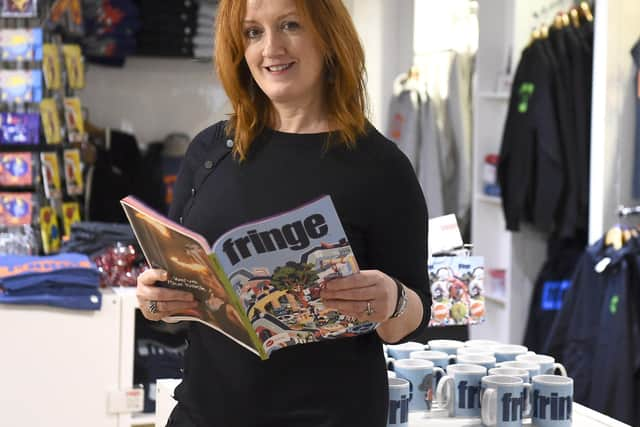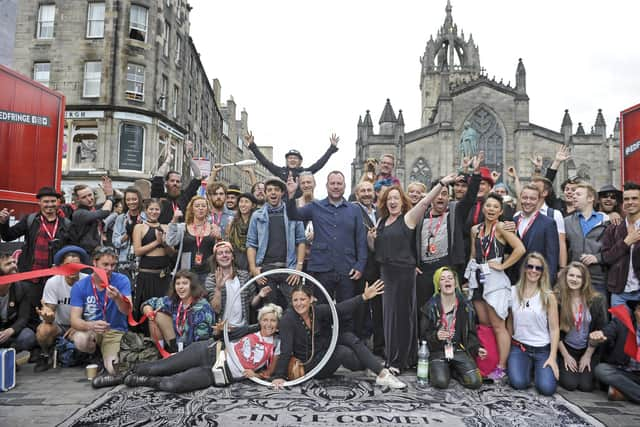Edinburgh Festival Fringe chief declares there will be 'absolutely no place' for exploitation at event in future
Fringe Society chief executive Shona McCarthy has pledged that the organisation will fully investigate allegations of serious breaches of the rights of workers at the festival, which will mark its 75th anniversary in August.
Ms McCarthy raised the prospect of a ban from the official programme, website and box office being imposed where illegal practices were found to be happening.
Advertisement
Hide AdAdvertisement
Hide AdAnd she urged venue workers to blow the whistle on bad practice during the festival by reporting concerns directly to the society, which does not have direct control over how venues are run.


Ms McCarthy revealed the society would be publishing a new “blueprint” in the summer setting out clear goals and pledges on accessibility, diversity and sustainability that “Fringe makers” would be expected to sign up to.
However, she defended the use of volunteers to help run venues, pointing out a “wide variety of operating models” had been in use across the festival, and that volunteer models had a “part to play” in the event in future.
Ms McCarthy said the society’s research had found 90 per cent of the venues operated with a paid staff model were paying workers the “Living Wage”.
A full-scale Fringe is expected to return in Edinburgh this August after the 2020 event was completely cancelled due to Covid. Last year’s festival was significantly scaled-back after the late easing of restrictions caused huge uncertainty for venues.


Ms McCarthy has predicted it may take the Fringe five years to recover from the pandemic, but also insisted she did not envisage or want to see it return to its previous scale, which was second only to the Olympics.
Speaking last summer, she admitted the ecosystem and business models around the Fringe had to change and there needed to be a conversation about why the event had not traditionally received public funding unlike the city’s other main festivals.
Advertisement
Hide AdAdvertisement
Hide AdThe Fringe Society has come under pressure in recent weeks after recruitment drives were launched by leading venues, some of whom are planning to use volunteers again, including C venues and the Pleasance.
Writing in The Stage, Ms McCarthy said: “The Fringe is a complex festival with a wide variety of operating models, and it’s important to distinguish the different systems in place.
"A significant number of venues use only paid staff, and these can include pop-ups and rented spaces, as well as permanent venues. Some spaces are not-for-profit and are run exclusively by volunteers.
"Others are run by performers’ collectives with a profit-sharing model. Some use a mixture of paid staff and volunteers, with the understanding that the model’s viability is not dependent on volunteering. Done right, both volunteer and staffed models have a part to play across the festival landscape.
Ms McCarthy pointed out volunteer schemes were “embedded and valued” in many of Edinburgh’s other festivals and within “countless” cultural organisations across Scotland.
She said: "The important thing is that every opportunity is fair, rewarding and has value for those taking part.
"We have clear guidelines on working conditions for employees and best practice for volunteers, developed in consultation with BECTU, Volunteer Edinburgh and Equity. We ask that Fringe companies and venues subscribe to these guidelines.
Advertisement
Hide AdAdvertisement
Hide Ad"I want to be clear, there is absolutely no place at the fringe for exploitation. Where any serious breaches of workers’ rights are reported, the Fringe Society will always investigate it fully.
"If illegal practices are found to be happening, we reserve the right to withdraw our services: specifically with inclusion in the programme, the website, promotional materials and ticketing through our box office.
"If any instance of bad practice occurs during the festival, we strongly urge workers to report this directly to us via our purpose-built system.
“We encourage everyone working and volunteering on the fringe to share their open, honest views. We will never stop striving for better and we will never stop rooting out bad practice.”
Ms McCarthy said the Fringe faced a serious question over how to make meaningful change happen while protecting the historic “open access” ethos of the festival.
She told The Scotsman: “The Fringe has so many different moving parts that it’s a real challenge to make change that brings everybody with you, but that’s what we’re about.
"We’re trying to lead change for the better that brings the venues, companies and artists with us.
Advertisement
Hide AdAdvertisement
Hide Ad“To me, the Fringe's open access principle is its unique selling point. It enables people from all backgrounds, whether they have the economic wherewithall or not to be part of it.
“The minute you lose that the Fringe becomes completely different and it would have to be a subsidised arts festival like any other curated festivals, which isn’t what it was intended to be.
“There’s been a concern about one or two of the volunteering models across the Fringe and whether they come too close to being mission critical.
“We've been working to create a new set of principles and within that there will be a whole new set of guidance on best employment and volunteering practices on the Fringe. It will look different in 2022 than it did in 2019. The world has moved on.”
Ms McCarthy called for new public funding to be put into the Fringe to help take the financial pressure off venues.
She said: “I’ve always argued that the Fringe Society itself needs public support because if we were to get a decent level of public investment we’d able to rely less on ticket sales.
"Our income generation wouldn’t be dependent on the festival itself and there would be more income in the ecosystem. Venues, companies and artists would all benefit if the Fringe Society was in receipt of any level of subsidy.”
Comments
Want to join the conversation? Please or to comment on this article.
